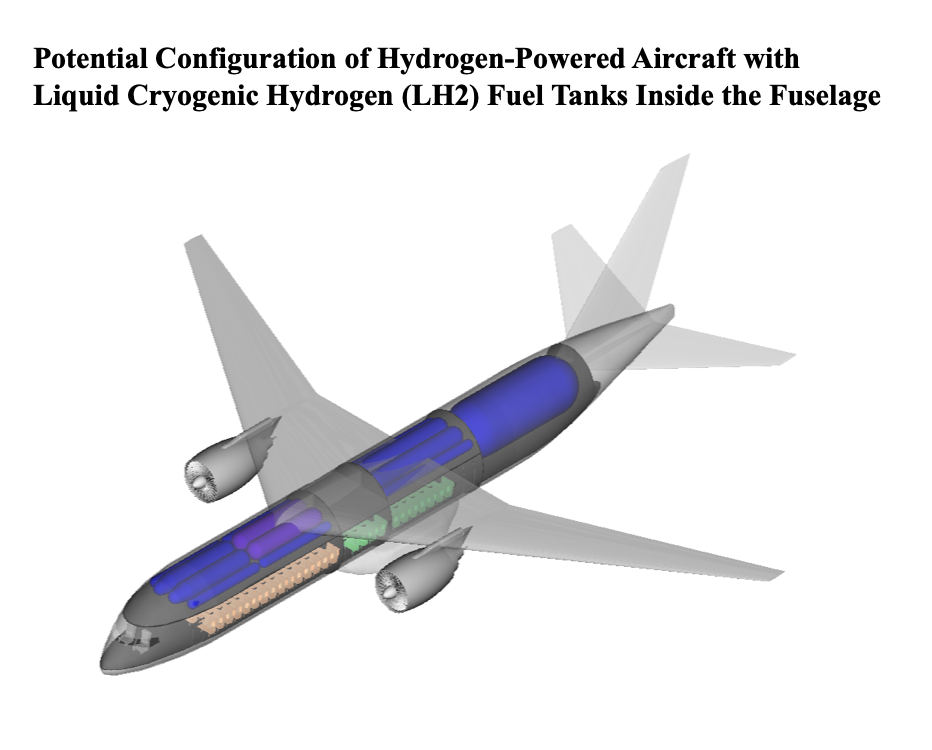Research Focus
For emission free ‘Green’ aviation, hydrogen fuel cell (HFC) powered drive train coupled with batteries and propellors for propulsion of a short- to mid-range aircraft will be considered in this project. Several crucial processes must occur to power the hydrogen fuel cell stacks. First, the air must be captured from the atmosphere, cooled, and pressurized to within the operating temperature and pressure of the hydrogen fuel cell. Similarly, the cryogenic fuel flow from liquid hydrogen (LH2) tank must be heated to within the operating conditions and the excess heat generated by the fuel cell stacks and electronics must be cooled and vented into the atmosphere. The power generated from the hydrogen fuel cell stacks must be filtered through a power management and delivery system which can combine the power output from the fuel cells and the battery array, converting the DC power output to an AC current, and dividing the total power among all the necessary components and the propellors. For the proposed study, a low temperature Proton Exchange Membrane Fuel Cell (LT-PEMFC) will be chosen, which operates using a membrane saturated in the liquid water to act as the electrolyte between the hydrogen fuel and the air. All this technology is built into WUADS (Washington University Aircraft Design Software). The student will learn the software in about two to three weeks and then apply it to create a HFC version of Jet-A fossil fuel operated Bombardier CRJ 200 and Boeing 717-200 mid-range aircrafts. It should be possible to complete the project in remaining eight weeks. In this project, the student will learn about the design and power requirements of an aircraft for a given number of passengers, cargo, take-off weight and range. It will require sizing of the aircraft as well as determination of power requirements. Power requirements will determine the design of the fuel cell power train. In the design of power train, the student will need to develop a flow chart of the thermal management system of the powertrain showing the flow of air and liquid hydrogen in various components, namely the turbo-compressor, liquid hydrogen tank, fuel cell stacks, various heat exchangers, water tank and pump and water separator etc.
Skills, Techniques, Methods
- The student will use some basic knowledge of fluid mechanics and heat transfer for analyzing the powertrain of a hydrogen fuel cell. However, it can be learnt in a week with the help of a mentor.
- The student will employ WUADS (Washington University Aircraft Design Software) to study an existing small to mid-range aircrafts such as Bombardier CRJ 200 or Boeing B717. The code is user-friendly and can be learnt in about 2-3 weeks and can be run on a workstation/laptop.
- It is desirable that the student possesses some familiarity in running a computer code in C++. Some programming skills in C++ will be helpful but not necessary.
Research Conditions
The CFD lab. has about 15 Workstations on which various software, namely WUADS, Fluent, RDSwin, WUHFC, OpenFOAM, WUOPT, MFIX, TOUGH2 and others, are installed. All students are assigned a computer with the software needed. The students can also access the software remotely using VPN. If needed, the students will also have access to McKelvey cluster for large scale computations. Most of the problems assigned to an undergraduate can be solved on a workstation or laptop. There is computational support from EIT on computer and software related issues; the assistance related to technical issues is provided by Prof. Agarwal or the doctoral students. The lab atmosphere is very collegial and welcoming to the new students.
Team Structure and Opportunities
The CFD lab. research team includes postdoctoral researchers, doctoral students, MS and undergraduate students. Undergraduate students work closely with one of the doctoral or MS students as their daily point-of-contact. Undergraduate students meet at least once a week with the CFD lab. Director Prof. Ramesh Agarwal. The CFD lab. has a weekly research group meeting, and the participating undergraduate/graduate students discuss their research and occasionally are asked to give a presentation in this meeting describing the progress and difficulties encountered during research. All undergraduate students have independent projects and conduct independent research under the mentorship of a doctoral student and PI.
Requirements
It is desirable that the student has taken the undergraduate level courses in Fluid Dynamics and MATLAB and possesses some familiarity in running a computer code in C++. Some experience with computer programming in C++ is a big plus, but not necessary.

Ramesh Agarwal
rka@wustl.edu
